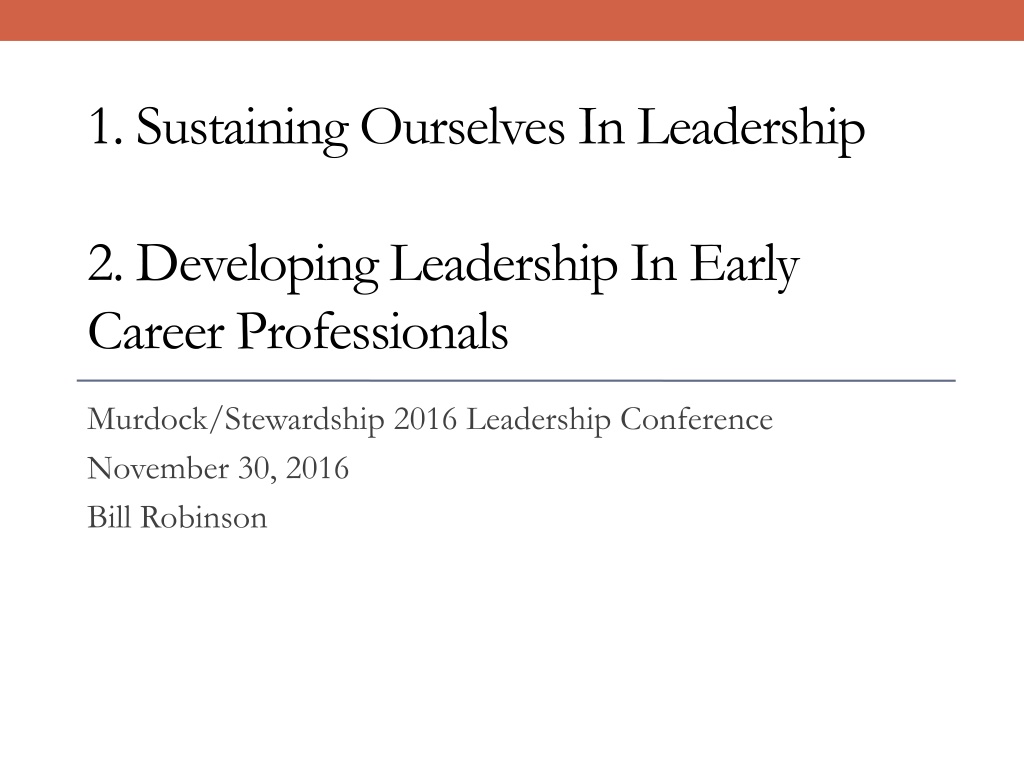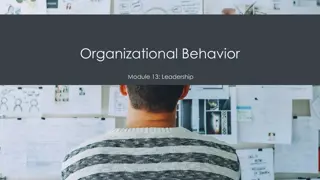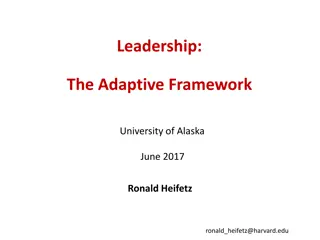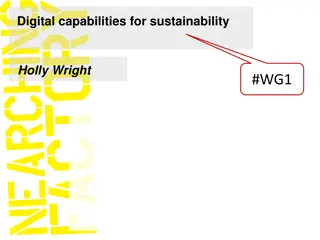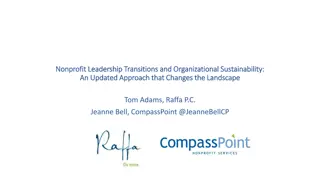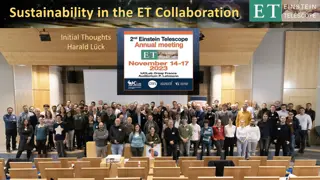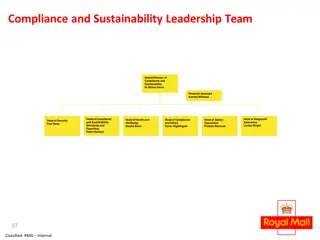Strategies for Leadership Sustainability and Development
This collection encompasses insights and practices shared at the Murdock/Stewardship 2016 Leadership Conference, focusing on sustaining oneself in leadership roles. It emphasizes maintaining physical, spiritual, and relational well-being, offering practical advice on striking a balance in various aspects of leadership and personal growth. The content delves into counseling, spiritual discipline, and unexpected actions to enhance leadership capabilities.
Download Presentation

Please find below an Image/Link to download the presentation.
The content on the website is provided AS IS for your information and personal use only. It may not be sold, licensed, or shared on other websites without obtaining consent from the author. Download presentation by click this link. If you encounter any issues during the download, it is possible that the publisher has removed the file from their server.
E N D
Presentation Transcript
1. Sustaining Ourselves In Leadership 2. Developing Leadership In Early Career Professionals Murdock/Stewardship 2016 Leadership Conference November 30, 2016 Bill Robinson
Sustaining Ourselves in Leadership In this session, focusing on the health of the leader, not of the business Sustaining ourselves Organizationally Engagement with business, staff and clientele Openness humility + honesty + transparency Balance Episodes vs. planned activities Offense vs. defense Leading from your strengths vs. stepping out of your comfort zone more to follow on this balance Sustaining ourselves Physically four cornerstones diet, exercise, sleep and fun Sustaining ourselves Spiritually faithful to your disciplines For me morning prayers, speaking prep, communion, accountability Sustaining ourselves Relationally internal and external both vital
Suggestions for sustaining ourselves that came up in the breakout session Counseling Discipline of setting aside time to listen to God Spiritual advisor Walking and thinking or praying I m sure there were others, but I don t have the notes just yet. Feel free to contact me if you have any questions. Wrobinson@whitworth.edu
Sustaining your leadership and developing others NOT YOUR STRENGTHS 2 YOUR STRENGTHS 1 ACTIONS EXPECTED FROM YOUR POSITION 4 3 ACTIONS UNEXPECT- ED FROM YOUR POSITION
Strengthening your leadership and developing others NOT YOUR STRENGTHS -------- YOUR STRENGTHS 2 1 Lead from here ACTIONS EXPECTED FROM YOUR POSITION -positioning -preparing -performing 4 3 ACTIONS UNEXPECT- ED FROM YOUR POSITION
Strengthening your leadership and developing others NOT YOUR STRENGTHS -------- YOUR STRENGTHS 2 1 Develop talent here Lead from here ACTIONS EXPECTED FROM YOUR POSITION -identify tasks that are expected but not essential -positioning -preparing -identify people who could outperform you in those tasks -performing 4 3 ACTIONS UNEXPECT- ED FROM YOUR POSITION
Strengthening your leadership and developing others NOT YOUR STRENGTHS - YOUR STRENGTHS 2 1 Develop talent here Lead from here ACTIONS EXPECTED FROM YOUR POSITION -identify tasks that are expected but not essential -positioning -preparing -identify people who could outperform you in those tasks -performing 4 3 ACTIONS UNEXPECT ED FROM YOUR POSITION Mentor talent here -use your instincts to find talented people and develop them here
Strengthening your leadership and developing others NOT YOUR STRENGTHS -------- YOUR STRENGTHS 2 1 Develop talent here Lead from here ACTIONS EXPECTED FROM YOUR POSITION -identify tasks that are expected but not essential -positioning -preparing -identify people who could outperform you in those tasks -performing 4 3 ACTIONS UNEXPECT- ED FROM YOUR POSITION Monitor and affirm talent here Mentor talent here -use your instincts to find and mentor talent here -identify growth ladders that differ from the one you climbed
Survey of CEOs, present and past I contacted 40 very successful current or former CEOs with this question: As you reflect on the early part of your career, what would you say most influenced the development of your leadership? Response ~25 responses 2/3 NFP, 1/3 business Examples of organizations Pepperdine University, Cowles Publishing Company, Murdock Charitable Trust, Kiemle and Hagood (commercial real estate)
A few key findings: Three parts to the findings - Initiatives CEOs took early in their careers Initiatives taken by others that helped CEOs develop their leadership early in their careers Leadership characteristics admired by CEOs early in their careers 1. 2. 3.
Initiatives CEOs took early in their careers that influenced their leadership development Attentiveness Listening Watching Assembling a profile or identifying a mentor Roughly half of the CEOs said they were always paying attention to leaders and leadership qualities they admired. So as I had the opportunity to be with other leaders, I observed very intently their behaviors and styles. By watching leaders I've been selective in adopting those practices that I've seen as healthy and productive while trying to eliminate from my leadership vocabulary any unhealthy or destructive practices. Training implications: Today s relentless diversions and distractions will compete hard for the attentiveness of young professionals. Organizations will have to provide some kind of program or incentive that requires Early Career Professionals (ECPs) to notice and study leadership traits they admire in others.
Initiatives CEOs took early in their careers that influenced their leadership development (cont.) Inquisitiveness Asking questions related to tasks Asking questions related to leadership CEOs recalled being unafraid to ask the kinds of questions that would help them learn their jobs, as well as ask questions related to leadership. As I look at myself (and other leaders I interact with) they are learners . There is just an inquisitive gene that I think leaders have or develop that makes them always ask questions, seek causality, drive to understand, etc. in ways that I think others just don t process at the same level. Training implications: After meeting five groups of ECPs, it became clear that access to the leadership was very important, but practiced unevenly. Moreover, even some of the ECPs with high access were timid about initiating contact with leaders. A helpful program would be one in which both ECPs and organizational leaders are regularly situated for Q&A about leadership attitudes and behaviors.
Initiatives CEOs took early in their careers that influenced their leadership development (cont.) Risk and responsiveness Learn from mistakes Rebound from failure Several CEOs said they tried to keep from making the same mistake twice. They also remember having a sense of perseverance that kept them driving. A significant moment for me was when my boss - the president - said to me, ----, I give you permission to fail." I thought, But, I don't intend to fail." His point was that I was holding back and that I needed to be willing to take more risks and that he would "have my back." That was remarkably liberating - and still is when I think about my role today as president. Training implications: CEOs identified their responsiveness as a more embedded than learned quality. However, some CEOs credited their supervisors for supporting risk and rebound.
Actions initiated by others that resulted in the CEOs early career leadership development Trust (in assigning responsibilities) Most effective when an authority s trust was higher than self-trust Support for the ECP allowed for mistakes or failure Trust ranked as a powerful leadership development facilitator. In the ECP, a superior s trust bred confidence, inspired high performance, and resulted in the superior delegating responsibility rather than tasks I think it was people who believed in and trusted me beyond my level of knowledge, experience or credential. This came through deep relationships and high levels of trust. Yes, I suppose it was also high levels of performance expectations but my own were usually higher, and more severe(!!) Training implications: Upper management needs to work with supervisors on the approaches and frequency with which they assign responsibilities and tasks to ECPs. Organizations need to make sure their cultures support the risks associated in trusting ELPs.
Actions initiated by others that resulted in the CEOs early career leadership development (cont.) Stretch jobs ( with or without visible trust) Being cast into a job that was bigger than I thought I could handle forced the CEOs to develop leadership skills Several CEOs found themselves in a sink or swim situation, but not necessarily because someone had enough trust to throw them into the water. They reported a feeling of either quickly growing into the job or failing. At age 27, my boss was 3000 miles away. I had to establish two offices, hire staff, build outside relationships. It was the deep end of the pool, but I grew in confidence and competence. Young leaders develop best when they are given freedom to experiment, fail, learn, and continue on. Training implications: The ideal ECP leadership development program will include real-time opportunities for the ECP to be engaged in a significant sole responsibility project or job. Supervisors/leaders need to be vigilant in looking for stretch jobs that can be given to ECPs.
Actions initiated by others that resulted in the CEOs early career leadership development (cont.) Engagement Genuine care for the ECP Asking questions and listening to the ECP Engagement with an admired leader lifts the ECPs to a level of openness and eagerness to learn from and emulate those leaders. The best mentors I ve had were willing to enter my world and expressed a personal interest in me . They were good at asking questions and employed a Socratic method of teaching so that my own self-discovery contributed to the learning process. / In a nutshell: Challenging, equipping, supporting, enjoying and encouraging young leaders and offering them friendship that extends beyond the task at hand. Training implications: A leader s multi-modal engagement (caring, watching, probing, socializing, etc.) with an ECP deepens the impact of characteristics an ECP sees in a leader/mentor.
Actions initiated by others that resulted in the CEOs early career leadership development (cont.) Investment in their development Recognizing potential that even the CEOs themselves did not see early in their careers Making special resources available CEOs remembered investment as the organization putting trust/confidence into action. I was nurtured by people who saw that I had more capacity than I realized. / They invested in my learning and development with time, instruction .They also gave me continuing opportunities to grow, learn, make mistakes, etc. It was not formal mentoring, but rather my opportunity to be involved daily in and observe their business and personal lives. Training implications: Upper management needs to identify its talented ECPs and decide how and in whom the organization should invest. These investments could create a sense of favoritism or uneven treatment, but there are ways to mitigate those feelings.
Actions initiated by others that resulted in the CEOs early career leadership development (cont.) Proximity Shadowing leaders Creating organizational lines of sight Most CEOs reported being in a good position to watch leaders whom they admired. Often (but not always), those leaders would intentionally create proximity. My entire life can be seen as the consequence of many people who allowed me to shadow them, and pulled me into settings that were transformative for me. I just learned a lot about leading from growing up with my Dad. The conversations that we would have around the dinner table; the example of his leading, his choices (and what he said) about leadership all of those things shaped how I thought about this job. Training implications: Leaders need to look for OTJ opportunities to give ECPs observational front rows.
Leadership qualities (unranked) CEOs mentioned as ones they admired early in their careers Humility Authenticity Big picture perspective Integrity Customer/clientele focus Asking and listening Vigilance always watching Drive Security in hiring up Recognition that everyone in the organization is important
5. Selected quotes from CEOs You ve got to think, even when young, about what impact you really want to make. What matters to you at the deepest/highest levels. Leaders have to listen intently but then point the direction forward. The ego is the monster under the bed waiting to devour you. Many young potential leaders do not have the self-confidence to initiate themselves, but they will respond to an invitation. The combination of stretching myself and trusting my instincts has served me well, I think.
Quotes Young leaders develop best when they are not micromanaged I loved the freedom to experiment, fail, learn, and continue on. I also noticed how he interacted to bring them out of their insecurity and his willingness to give them responsibility even if they may fail. Role models didn t even know that I was watching or that they were educating me, but they were models of getting things done. Put customer and client interests ahead of your own. Rarely do you get burned by making this occur.
Quotes It was not formal mentoring, but rather my opportunity to be involved daily in and observe their business and personal lives. They knew I was inexperienced, but they trusted my calling more than I did. It was their trust that opened the deep well. Never quit learning. Always listen and grab snippets from those you respect. I was also watching everyone I could to see what worked and what didn t. Even now, I watch other people s style, strategy and tactics for leading everything from the simplest weekly meetings to a long-term strategic planning process.
Quotes The first thing that comes to mind for me is not a single mentor, but a series of mentors who gave me responsibilities or let me pursue projects that I was not ready for or prepared to do that let me test my abilities, learn things outside of the area I was working in, stretch and grow. I was both prodded and nurtured along by a whole list of people who saw that I had more capacity than I realized (certainly in the that moment, at least).
Summary of the ways in which CEOs developed leadership early in their careers Learning CEOs learned about leadership early in their careers by watching and listening to effective leaders. Doing The most effective skill development laboratory was a job that felt beyond their capacity but one for which they would be held totally responsible.
